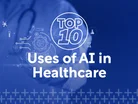
AI is having a massive impact on the provision of healthcare, helping with everything from reducing administrative burdens to making hospitals communications more efficient. Here, we look at the Top 10 uses of AI in the healthcare sector.
10. AI in healthcare: Remote blood-monitoring solutions
Companies such as Binah.ai are using AI and associated technology to turn camera-equipped devices, such as smartphones, tablets, laptops, mirrors etc – into body monitoring solutions.
Binah.ai's software removes the need for wearables and enables end-users to take bloodless blood tests and measure cholesterol levels, blood pressure, heart rate, stress levels, oxygen saturation and respiration rate.
09 AI in healthcare: Digital transformations
IT software company ABBYY has created a no-code AI platform that can be used to help healthcare organisations with their digital transformation journeys.
It allows healthcare professionals to create AI-powered robots to help them support patients in non-clinical ways, allowing them to focus on clinical outcomes. ABBYY is used by an estimated 5,000 companies, across multiple sectors, including healthcare.
08 AI in healthcare: Healthcare decision-making
In June, Royal Philips released the findings of its annual Future Health Index 2024 report, Better Care for More People. The report revealed a significant shift among healthcare leaders toward AI-enabled innovations to mitigate the challenges of workforce shortages, financial pressures, and increasing demand for services.
The findings show that AI for clinical decision support is already being used for in-hospital patient monitoring by 43% of healthcare leaders, with further investments planned over the next three years. Further investments are expected to drive advances in patient care and operational efficiency.
07 AI in healthcare: Understanding healthcare trends
Hospitals can use AI to better understand demand trends and manage staffing and inventory. By embracing AI-driven solutions, we are not only streamlining operations but propelling the care and outcomes of patient treatments to unprecedented heights. The journey ahead is nothing short of phenomenal, and as we pioneer this transformative frontier, the future of healthcare promises to be a testament to the limitless possibilities that cutting-edge technology can bring to our industry.
06 AI in healthcare: Breast cancer detection
An AI tool tested by the UK’s National Health Service (NHS) in Scotland has identified ultra-early signs of breast cancer in 11 women that had been missed by clinicians.
The tool, called Mia, was piloted alongside NHS Grampian doctors, and analysed the mammograms of over 10,000 women. Mia is developed by London-based Kheiron Medical Technologies, and the solution is supported by Microsoft’s Azure Cloud.
Most of the cases were cancer-free, but Mia successfully flagged all of those with symptoms, as well as an extra 11 the doctors did not identify, because at very early stages cancers can be extremely small and hard to spot.
Yet crucially, breast cancer patients with tumours smaller than 15mm at the time of discovery have a 90% five-year survival rate.
05 AI in healthcare: Heart attack prevention
Cardiovascular disease risk prediction specialist Caristo Diagnostics has published a clinical study that shows AI can identify patients at risk of a heart attack up to 10 years in advance, even when they were deemed healthy by current diagnostic methods.
The study, published in one of the most esteemed peer-reviewed journals, The Lancet, involved over 40,000 patients, includes a number of eye-catching findings.
Notable among these was that coronary inflammation measured by the AI tool predicted fatal and non-fatal cardiac events at least 10 years in advance.
04 AI in healthcare: Easing the admin burden
Google Cloud’s Vertex AI Search for Healthcare helps developers build better technology to ease the administrative burden on clinicians and other health workers.
The solution helps healthcare and life sciences organisations leverage data and Gen AI solutions to reduce clinician stress, plug global nursing staff shortfalls and improve patient outcomes.
03 AI in healthcare: Reducing staff shortages
Google’s Vertex solution is also helping to ease the global shortage of nurses. This is a serious problem; the World Health Organisation estimates the shortfall to be around 13 million. Google Cloud says Vertex “presents a clear opportunity for healthcare providers, payers, electronic health records companies, and life science companies to build genAI solutions that empower healthcare workers and other employees to work more efficiently and effectively”.
02 AI in healthcare: Innovation
A study by IT services and business solutions specialist Tata Consultancy Services shows that more than half (52%) of healthcare businesses expect AI technology to help productivity at least double in coming years.
But ‘TCS AI for Business Global Study’ finds that 69% of businesses are more focused on using AI to drive innovation and increase revenue than on productivity improvement and cost optimisation.
It also shows most (86%) of senior business leaders have already deployed AI to enhance existing revenue streams or create new ones.
Vertex is designed to ease physician burnout, which according to a report from Medscape, was running as high as 53% in 2022.
01 AI in healthcare: Improving patient outcomes
The excitement around Gen AI is its ability to deliver more precise, targeted intelligence using large language models that take in huge volumes of data and then simulates all the possibilities based on algorithms and history.
During hospital visits patients might be hooked up to various devices, none of which talk to each other. AI can bring patient data into one intelligent layer, making it easier for caregivers to respond to the alerts and signals that matter most. Gen AI helps identify the right resource to oversee patient care and take action at the right time.
- Virginie Helias: How P&G Champions Healthcare SustainabilitySustainability
- AstraZeneca CSO Pam Cheng: Health Equity & SustainabilitySustainability
- McKinsey, GSK & Novo Nordisk: This Week in HealthcareTechnology & AI
- How Cardinal Health Creates Sustainable Supply ChainsMedical Devices & Pharma




